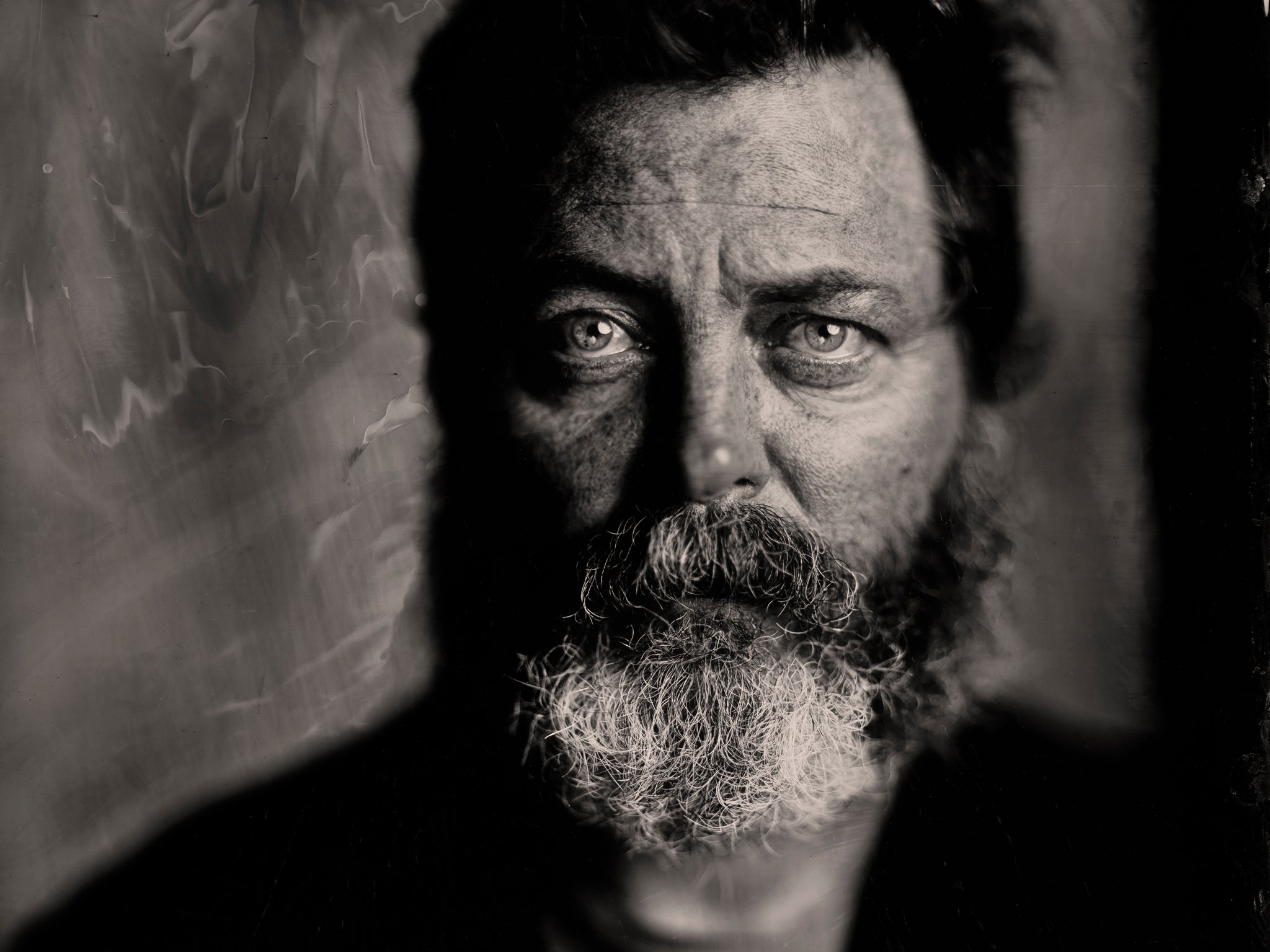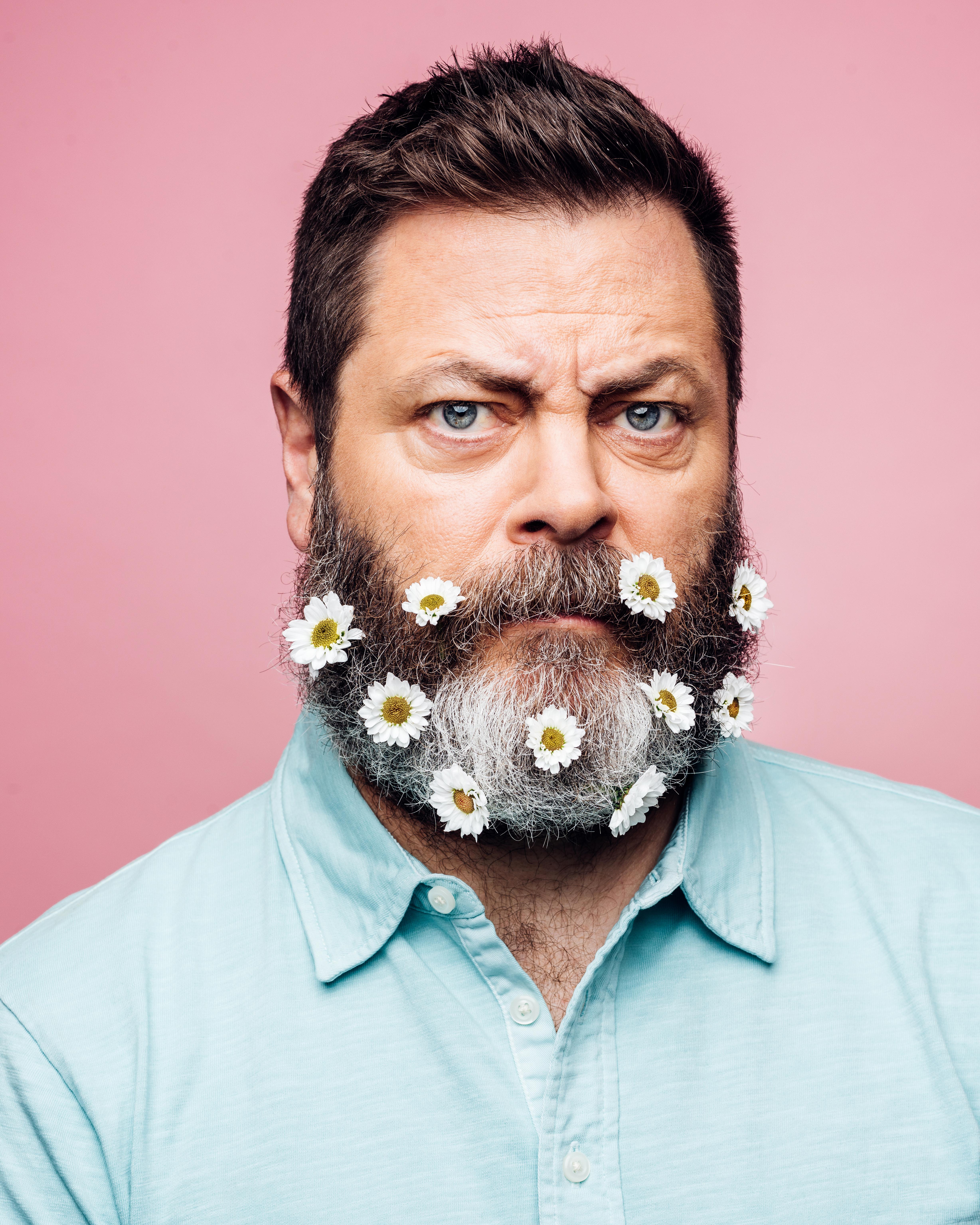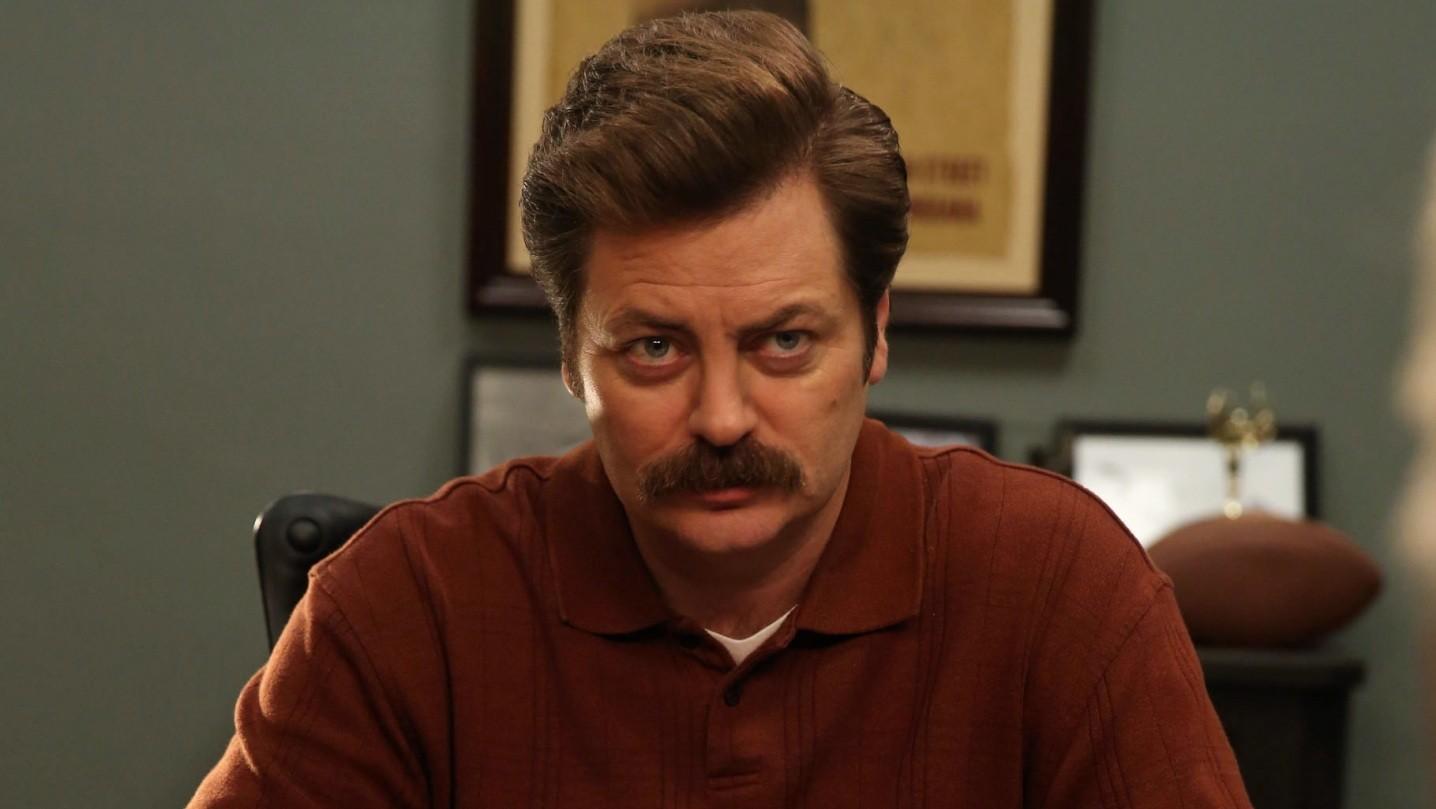Nick Offerman: ‘I’m sorry if it makes you cry that I don’t jive with your weird Fox News mentality’
The ‘Parks and Recreation’ star talks to Annabel Nugent about playing quarterback Colin Kaepernick’s father, growing up in small-town America and people’s strange misconception of him as a ‘man’s man’


Nick Offerman is not Ron Swanson. It’s been six years since the actor last played the gruff but lovable bacon enthusiast and anti-government bureaucrat in Parks and Recreation, and yet he still finds himself having to remind people he is not him. To be fair, I can see why they’d think that. On our call, the actor is also a gruff but lovable conversationalist. He enjoys many of the same things as Swanson: woodwork, whisky, nature and straight-talking. And then there’s the voice. That smooth unmistakable baritone, thick and rich like a dollop of heavy cream.
Offerman operates on the lowest of keys. He is calling from his home in Los Angeles using the Zoom account of his wife, the actor Megan Mullally (when I bring up this domestic detail, he says that he is certainly “not as cute” as her). He’s wearing a bright navy shirt and his Swanson-esque moustache is intact, though greyer now and attached to a full beard.
Across seven seasons of Parks and Rec, Offerman made Ron’s wholesome brand of tough love his calling card. It was a speciality he took to the big screen in comedies including We’re the Millers, 21 Jump Street and its sequel. Recently, the 51-year-old has roamed into more serious fare. His role in the second season of FX’s Fargo was followed by the critically acclaimed drama series Devs, in which Offerman played a conspiratorial tech CEO. In his current series, though, some version of Swanson unexpectedly peeks through.
Colin in Black and White tells the coming-of-age story of Colin Kaepernick, the San Francisco 49ers quarterback who knelt during the US national anthem in a protest against racism and police brutality. Kaepernick was rebuked for his actions by the NFL institution, which echoed a large portion of Americans, too. The Colin of Ava DuVernay’s Netflix docudrama is yet to experience any of this. He is a teenager, played by newcomer Jaden Michael. Offerman and Weeds star Mary-Louise Parker play his adoptive parents, Rick and Teresa. Offerman’s Rick is a man of few words; he loves his son but he is not understanding of his hardships.
Offerman calls Kaepernick “the closest thing to a superhero we have going these days”. But not everyone feels the same. The actor can recall family holidays back in 2016 arguing with relatives who would say the footballer hates America. “I’m considered the snowflake in my family,” he offers by way of an explanation. The series hits close to home for other, more literal reasons, too. Kaepernick grew up in Wisconsin just a few hours north of where Offerman was raised in Joliet, Illinois.
Though Hollywood is home now, the actor wears his small-town upbringing on his sleeve. Expressions like “holy cow” and “well, gosh” roll from his mouth like treacle. “Oh boy” is another delight. Speaking about how small his small town truly was, Offerman jokes, “Eventually, we got a second grocery store.” The city has since become a bedroom community for commuters shuttling into Chicago but when Offerman was growing up, the population was around 1,000. “It used to be that you would know everybody: the school bus driver, all the shop owners and the farming families, the mailman – or woman,” says the actor, sounding a little rueful. Offerman is the kind of guy who does this often – makes an effort to be inclusive and corrects himself when he is not. It’s a lens through which the actor has reconsidered much of his rural childhood.
“It was very conservative,” explains Offerman, who is a vocal Democrat. “It’s an incredibly white community with all the trappings…” Here, he adopts the tone of a carnival worker reading a list of prizes up for grabs. “We’ve got homophobia. We’ve got xenophobia. We’ve got racism. You name it.” Nevertheless, Offerman is inclined to see the good in people. He attributes their discriminations to ignorance rather than malice. “As far as we’re concerned, we’ve got good values, we go to church, we work hard, we’re decent people. My parents are the most selfless couple of citizens I’ve ever met in my life. But nobody thinks about why there are no people of colour in our school.”
It never occurred to me that I would be accused of such masculinity
Keeping true to his country-life upbringing, Offerman was raised Catholic. He was an altar boy before later becoming a lector responsible for reciting the gospel. The pageantry of church, though, bored him. “I realised that nobody was into it.” The mood in the congregation was closer to that of a dentist’s waiting room – if the patients were zombies. And not the feeding-frenzy kind; the catatonic kind. “They were going through the motions so that they could go home, watch the football and have a meal.” He’s since politely stepped away from organised religion.
There is one fond memory Offerman has of his religious upbringing. “We had this nun, Sister Jezawena, who was a scandalous figure,” he says. Sister Jezawena would bring in pornographic magazines for the class to look at in order to explain why it was so bad. Offerman tells the story with amused disbelief, his eyebrows knitted together. Of course, he and his peers – all around the age of hormone-raging puberty – were ecstatic. “The entire class was like, ‘Yes, Sister. This class is working really well. I want to be holy.’” He chuckles, clasping his hands together in prayer.

It was in theatre that he eventually found the feeling church had been attempting to evoke all those years. “Once I entered that world, I realised, ‘Oh, this is what they were going for.’” He jokes that his priests back then “could have used a couple semesters of theatre school”. It was also at the University of Illinois where Offerman was confronted with how small his world had been before. There, he toured Japan doing kabuki theatre and did two semesters of ballet. He was welcomed into the fold by “generous, much cooler kids from the city or the suburbs”. His friends had older siblings that gave them the “good s***” – the counterculture plays, albums, movies, books. Offerman had only the radio and television at his disposal. “I definitely felt ignorant culturally arriving among them, but they took me under their wings and set me off on a path of tutelage that I still walk to this day.” He succeeded. There in Illinois in the early Nineties, he co-founded Defiant Theatre. His experimental Chicago company won acclaim for productions that ranged from Shakespeare to Stephen King. Despite this and the success that followed, Offerman insists he is “still trying to catch up”.
Still, the actor has learnt there is unmatched value in his less-than-metropolitan upbringing. “It took me years to understand that my experiences in life were just as valuable as anybody else’s,” he explains, attributing the change to writer and environmental activist Wendell Berry. “[My upbringing] gave me a point of view that people find refreshing, inexplicably so,” he says with a laugh. “And by God, I’m going to milk that for all its worth.”
A considerable cult has grown around Offerman over the last decade. A 30-minute compilation of Ron Swanson’s best moments has 31 million views on YouTube. A quick Google search will yield hundreds of photographs depicting Offerman’s face permanently inked onto various body parts. The woodwork, the scotch, the burly voice, the impressive facial hair: all of it has led to an image of Ron Swanson, the character, and by extension Nick Offerman, the actor, as a man’s man. The ultimate dude who cuts wood and sips whisky by the fire.

“It never occurred to me that I would be accused of such masculinity,” he explains. “I never said, ‘Oh, I’m going to be a manly figure.’” Keeping a moustache wasn’t some pursuit of manhood. He grew one because his Uncle Don and Uncle Dan had moustaches when he was a kid. He also grew up with two sisters “who could beat the crap out of me”. “Some of us use tools and grill steak, some of us sew clothing. And I like to do all those things. I take a lot of pride in my needlework. And I don’t consider that manly or feminine, I just consider it practical.”
Offerman remains “befuddled” that some people believe Swanson would’ve voted for Trump. Even if that were true – he assures me wholeheartedly that it’s not – the actor is doubly confused by the notion that anyone would expect the actor who plays him to. In fact, this morning’s events bore the most recent example. Offerman had been scrolling through Amazon reviews of his book when he saw one that made him cringe. He pauses, thinking for a moment before deciding to read it verbatim to me, presumably to get across the absolute absurdity. The actor pulls out his phone and begins: “Do not judge a book by its cover. This book is not what I expected. It’s chock full of politics, liberal-leaning, and is not much about exploring nature…” He goes on to recite the review in full, disrupting at moments to add in his own commentary (“He says I look down on hunting! I admire hunting!”). He continues, “So finally in all-caps, the person writes: ‘The author is NOT Ron Swanson… just another liberal elite, pretending that he is something that he is not. A sad revelation to this reviewer…’” He averts his eyes back to the camera in a Parks and Rec-style mockumentary moment of incredulous disbelief. When Offerman doesn’t “jive with someone’s sort of weird, Fox News view of him, they’re crushed”, he says. “You can almost see this person crying and feeling the betrayal as they type.”
Other times, the actor will see politicians whose politics he despises using memes of him. “I’ll think, ‘Oh, boy that’s a bummer.’” Today, like many others, Offerman saw the viral tweet of Mitt Romney – “a pretty strange Republican from the Morman Church in Utah” – dressed up as Ted Lasso, the folksy and adorable football coach character played by vocal Democrat Jason Sudeikis. “All those characters and all the people that created that content would hate you,” says Offerman of the phenomenon more generally. The actor does, however, add that “everyone has to be allowed to like what they like”.

Offerman’s Parks and Rec co-star Amy Poehler has described him as possessing “all of the macho underpinnings, but the heart of a young teenage girl in love”. It’s an accurate assessment of the man speaking to me now, who visibly lights up talking about his wife. “She’s like if Mel Brooks’s career was a drop-dead gorgeous, talented woman,” he gushes. Offerman proposed to Mullally in Regent’s Park by the Japanese garden using a little walnut heart-shaped ring box that he had hand-carved in his woodshop. Of all the things he has made – including a replica of Gandalf’s pipe from Lord of the Rings, and a coffin-shaped box to stash his friend’s weed – this ring box is his favourite. “That’s the most important story of my life.”
Mullally is also a big part of why Offerman no longer smokes weed. He used to smoke regularly, giving an interview to The High Times in 2013 after eating a maple bacon chocolate chip cookie edible. “My life is happy enough that I don’t actually want it,” says the actor now. But he’s sad that his predilection didn’t overlap with the drug’s current heyday. Offerman shakes his fist in mock outrage. “When I depended on marijuana for escapism, I couldn’t get the good stuff and now that I can afford the most incredible pot, I don’t want it!” He still keeps a stash in his house, should he ever change his mind.
And what does the rest of the day have in store? He doesn’t have time to go for a hike, he says, because he has the “wonderful chore of signing books”. Then he’ll make some lunch for himself and Megan. On second thought, he will go for a run later. “I’ll look at some leaves while I do,” he says. Offerman really is Hollywood’s most wholesome resident.
‘Colin in Black and White’ is available to stream on Netflix now
Join our commenting forum
Join thought-provoking conversations, follow other Independent readers and see their replies
Comments


Bookmark popover
Removed from bookmarks